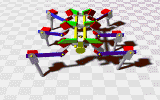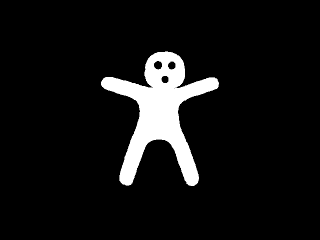


hat tip zoesaldana for images on left and right; this grouping of three from dump.fm.
Have been meaning to repost this item that Richard Stallman sent to the disquiet blog:
I found your article "The Downturn: An Answer Album" a clever response to The Atlantic. However, in one point it undermines itself by incorporating the adversary’s propaganda term: the pseudo-concept "intellectual property."
That term lumps together a dozen different laws which have nothing important in common. Those laws work differently and have different practical results. Thus, generalizing about them can only mislead.
Your article’s real topic is clear and coherent: one law, copyright. It doesn’t include patents, trade secrets, trademarks, publicity rights, controlled geographical designations, or any of the other dozen laws that some call "intellectual property." With this clear and coherent topic, the article can be clear too, and mostly it is. However, where it uses the term "intellectual property" instead of "copyright," it trades the clear topic for a confused one.
When I noted how this term tends to confuse every discussion it appears in, I decided to avoid it. In the several years since then, I have never had an occasion to use the term. I mention whichever law is really the issue. These laws are so different that it is never useful to generalize about them. When others do so, the best thing for me to do is to respond by explaining how that is confused.
So I’d like to suggest that you change the article, replacing "intellectual property" with "copyright," which will make it sharp and clear all through.
Thanks for listening.
See gnu.org for a full explanation of the bias and confusion in “intellectual property” and why, we should firmly refuse to use it.
In the gnu.org article Stallman explains:
The term carries a bias that is not hard to see: it suggests thinking about copyright, patents and trademarks by analogy with property rights for physical objects. (This analogy is at odds with the legal philosophies of copyright law, of patent law, and of trademark law, but only specialists know that.) These laws are in fact not much like physical property law, but use of this term leads legislators to change them to be more so. Since that is the change desired by the companies that exercise copyright, patent and trademark powers, the bias introduced by the term "intellectual property" suits them.
And
Copyright law was designed to promote authorship and art, and covers the details of expression of a work. Patent law was intended to promote the publication of useful ideas, at the price of giving the one who publishes an idea a temporary monopoly over it—a price that may be worth paying in some fields and not in others.
Trademark law, by contrast, was not intended to promote any particular way of acting, but simply to enable buyers to know what they are buying. Legislators under the influence of the term "intellectual property," however, have turned it into a scheme that provides incentives for advertising.
To make the argument as assertively as possible: copyright, trademark and patent each are creatures of very specific sets of laws and circumstances and lumping them together is a deliberate (or passive) attempt to confuse and condition the public into accepting broad claims of property rights that basically do not exist. You should always question which particular claim someone is making against you (say, in a cease and desist letter) and insist that they offer proof within the strict letter of the relevant law before obeying them.
...in a stellar collection posted on Lalblog. Foreground items made awesome by cosmic vistas include cats, more cats, a ballerina, a chocolate covered cherry, a Commodore keyboard, hops (for beer), rollercoaster riders, a skull, nudes, and cubes of steak!


miyazaki GIF on left; "Head Roll" GIF on right by Ilan Katin
j1p2m3 posted Head Roll to dump.fm and then I did the above pairing.
![]()
![]()
![]()
![]()
![]()
![]()
![]()
![]()
![]()
![]()
![]()
![]()
![]()
![]()
![]()
![]()
![]()
![]()
![]()
![]()
![]()
![]()
![]()
![]()
![]()
![]()
![]()
![]()
![]()
![]()
![]()
![]()
![]()
![]()
![]()
![]()
![]()
![]()
![]()
![]()
![]()
![]()
![]()
![]()
![]()
![]()
![]()
![]()
![]()
![]()
![]()
![]()
![]()
![]()
![]()
![]()
![]()
![]()
![]()
![]()
![]()
![]()
![]()
![]()
![]()
![]()
![]()
![]()
![]()
![]()
![]()
![]()
![]()
![]()
![]()
![]()
![]()
![]()
![]()
![]()
![]()
![]()
![]()
![]()
![]()
![]()
![]()
![]()
![]()
![]()
![]()
![]()
![]()
![]()
![]()
![]()
![]()
![]()
![]()
![]()
![]()
![]()
![]()
![]()
![]()
![]()
![]()
![]()
![]()
![]()
![]()
![]()
![]()
![]()
![]()
![]()
![]()
![]()
![]()
![]()
![]()
![]()
![]()
![]()
![]()
![]()
![]()
![]()
![]()
![]()
![]()
![]()
![]()
![]()
![]()
![]()
![]()
![]()
![]()
![]()
![]()
![]()
![]()
![]()
![]()
![]()
![]()
![]()
![]()
![]()
![]()
![]()
![]()
![]()
![]()
![]()
![]()
![]()
![]()
![]()
![]()
![]()
![]()
![]()
![]()
![]()
![]()
![]()
![]()
![]()
![]()
![]()
![]()
![]()
![]()
![]()
![]()
![]()
![]()
![]()
![]()
![]()
![]()
![]()
![]()
![]()
![]()
![]()
![]()
![]()
![]()
![]()
![]()
![]()
![]()
![]()
![]()
![]()
![]()
![]()
![]()
![]()
![]()
![]()
![]()
![]()
![]()
![]()
![]()
![]()
![]()
![]()
![]()
![]()
![]()
![]()
![]()
![]()
![]()
![]()
![]()
![]()
![]()
![]()
![]()
![]()
![]()
![]()
![]()
![]()
![]()
![]()
![]()
![]()
![]()
![]()
![]()
![]()
![]()
![]()
![]()
![]()
![]()
![]()
![]()
![]()
![]()
![]()
![]()
![]()
![]()
![]()
![]()
![]()
![]()
![]()
![]()
![]()
![]()
![]()
![]()
![]()
![]()
![]()
![]()
![]()
![]()
![]()
![]()
![]()
![]()
![]()
![]()
![]()
![]()
![]()
![]()
![]()
![]()
![]()
![]()
![]()
![]()
![]()
![]()
![]()
![]()
![]()
![]()
![]()
![]()
![]()
![]()
![]()
![]()
![]()
![]()
![]()
![]()
![]()
![]()
![]()
![]()
![]()
![]()
![]()
![]()
![]()
![]()
![]()
![]()
![]()
![]()
![]()
![]()
![]()
![]()
![]()
![]()
![]()
![]()
![]()
![]()
![]()
![]()
![]()
![]()
![]()
![]()
![]()
![]()
![]()
![]()
![]()
![]()
![]()
![]()
![]()
![]()
![]()
![]()
![]()
![]()
![]()
![]()
![]()
![]()
![]()
![]()
![]()
![]()
![]()
![]()
![]()
![]()
![]()
![]()
![]()
![]()
![]()
![]()
![]()
![]()
![]()
![]()
![]()
![]()
![]()
![]()
![]()
![]()
![]()
![]()
![]()
![]()
![]()
![]()
![]()
![]()
![]()
![]()
![]()
![]()
![]()
![]()
![]()
![]()
![]()
![]()
![]()
![]()
![]()
![]()
![]()
![]()
![]()
![]()
![]()
![]()
![]()
![]()
![]()
![]()
![]()
![]()
![]()
![]()
![]()
![]()
![]()
![]()
![]()
![]()
![]()
![]()
![]()
![]()
![]()
![]()
![]()
![]()
![]()
![]()
![]()
![]()
![]()
![]()
![]()
![]()
![]()
![]()
![]()
![]()
![]()
![]()
![]()
![]()
![]()
![]()
![]()
![]()
![]()
![]()
![]()
![]()
![]()
![]()
![]()
![]()
![]()
![]()
![]()
![]()
![]()
![]()
![]()
![]()
![]()
![]()
![]()
![]()
![]()
![]()
![]()
![]()
![]()
![]()
![]()
![]()
![]()
![]()
![]()
![]()
![]()
![]()
![]()
![]()
![]()
![]()
![]()
Arranged these 480 single GIFs to be screen captured and turned into a single GIF for posting on dump.fm. Line breaks are something you can't do with the normal dump upload (unless you know some CSS voodoo). It is reduced on dump unless you click on it--then it appears as it does here.